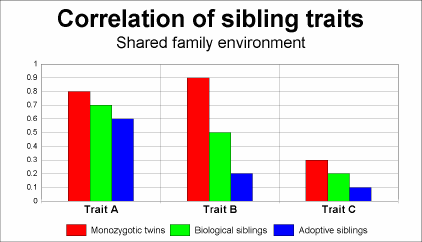
This is a placeholder text
Group text
by vtgsd on 18 March 2015 - 22:03
"Cross-fostering “nervous” pups onto “normal” bitches had no effect of behavior."
I can't find the original study but I did find this...
It's my belief that a good dog that is not suffering a medical condition, if raised in a bad environment, once it's removed from that bad environment it will bounce back. Many behaviors are "learned behaviors". If it's living with a person with psychiatric disorder where for example they throw things, the dog will learn to run/move quickly to get the heck out of the way. I wouldn't call this genetic fear, self preservation/learned behavior. What else is a dog to do besides learn to get out of the way?...
by Sunsilver on 18 March 2015 - 23:03
VTgsd, the pups were from nervous mothers, and were not necessarily nervous themselves. The litters were swapped at birth. Just wanted to make that clear!
The ability of some dogs to overcome a horrible environment (e.g. being born in a puppy mill) amazes me, and shows that behaviour must have a very strong genetic link.
by joanro on 18 March 2015 - 23:03
by bubbabooboo on 19 March 2015 - 02:03
Nature or simple genetic inheritance is not as important as environment and the interaction of environment with genetics. I scientific fact but it must be said that some less complex traits are more easily influenced by genetics (height) than more complex traits (intelligence). LInk to a discussion below. For every BSP or BSZS or WUSV winner there were a hundred dogs with equal or better genetics that did not win or even compete in that contest or sport. That's why breeding every female GSD to the latest flavor of the year GSD male is an exercise in futility.
http://en.wikipedia.org/wiki/Nature_versus_nurture
by gsdstudent on 19 March 2015 - 11:03
nature vs nurture; everyone's index finger fits perfectly into their nostril. Is that nature or nurture? All seriousness aside, One without the other leaves a big hole in the whole.
by bubbabooboo on 19 March 2015 - 15:03
"A fact without a theory is a final tragic act but there's one thing worse in this universe and that's a theory without a fact" .. a ditty from undergraduate school ..
This chart illustrates three patterns one might see when studying the influence of genes and environment on traits in individuals. Trait A shows a high sibling correlation, but little heritability (i.e. high shared environmental variance c2; low heritability h2). Trait B shows a high heritability since correlation of trait rises sharply with degree of genetic similarity. Trait C shows low heritability, but also low correlations generally; this means Trait C has a high nonshared environmental variance e2. In other words, the degree to which individuals display Trait C has little to do with either genes or broadly predictable environmental factors—roughly, the outcome approaches random for an individual. Notice also that even identical twins raised in a common family rarely show 100% trait correlation.

In case you were wondering there is little evidence for identical twins in dogs. So all puppies in a litter from the same parents are fraternal siblings but not identical twins such that the heritability of traits based on genes within a litter or previous or subsequent litters from the same parents is the same and less than the higher degree of similar genetics as found in identical or monozygotic twins. It should also be noted that even so called identical twins are not identical in all traits due to environmental influences.
http://www.dogchannel.com/dog-magazines/dogworld/dog-world-extras/can-dogs-be-identical-twins.aspx
by gsdstudent on 19 March 2015 - 18:03
VTGSD has a thread above, which shows a study where dogs were ''cross fostered'' in a "Murphree'' investigation. It says there was no influence by confident foster moms on nervous foster off spring's behavior. Nurture can do only so much for nature or you can not change a tiger's stripes.
by bubbabooboo on 20 March 2015 - 15:03
Stripes are highly inheritable but behaviors are not.
by joanro on 20 March 2015 - 15:03
I agree on the stripes, but not the behavior. For example, I have dogs that use their nose to bury their poop....the same way my husky/wolf hybred crosses did. The gsd that do this have one thing in common, with the exception of one female,..they have Puci close in their pedigree. I have four year old brother and sister littermates, Puci grandpups on paternal side. Their dam does not bury her poop, neither does her daughter, but the son does, as did their sire. So obviously, this behavior was not learned, but inherited. It is not a common behavior for a dog to use their nose to push loosened dirt or shavings to cover their pile of poop. I'm not talking about kicking with back feet after taking a dump.
by gsdstudent on 20 March 2015 - 16:03
let's hope the stripe, which is inherited, is not yellow and down the dog's back. That stripe will effect behavior.
Contact information Disclaimer Privacy Statement Copyright Information Terms of Service Cookie policy ↑ Back to top




